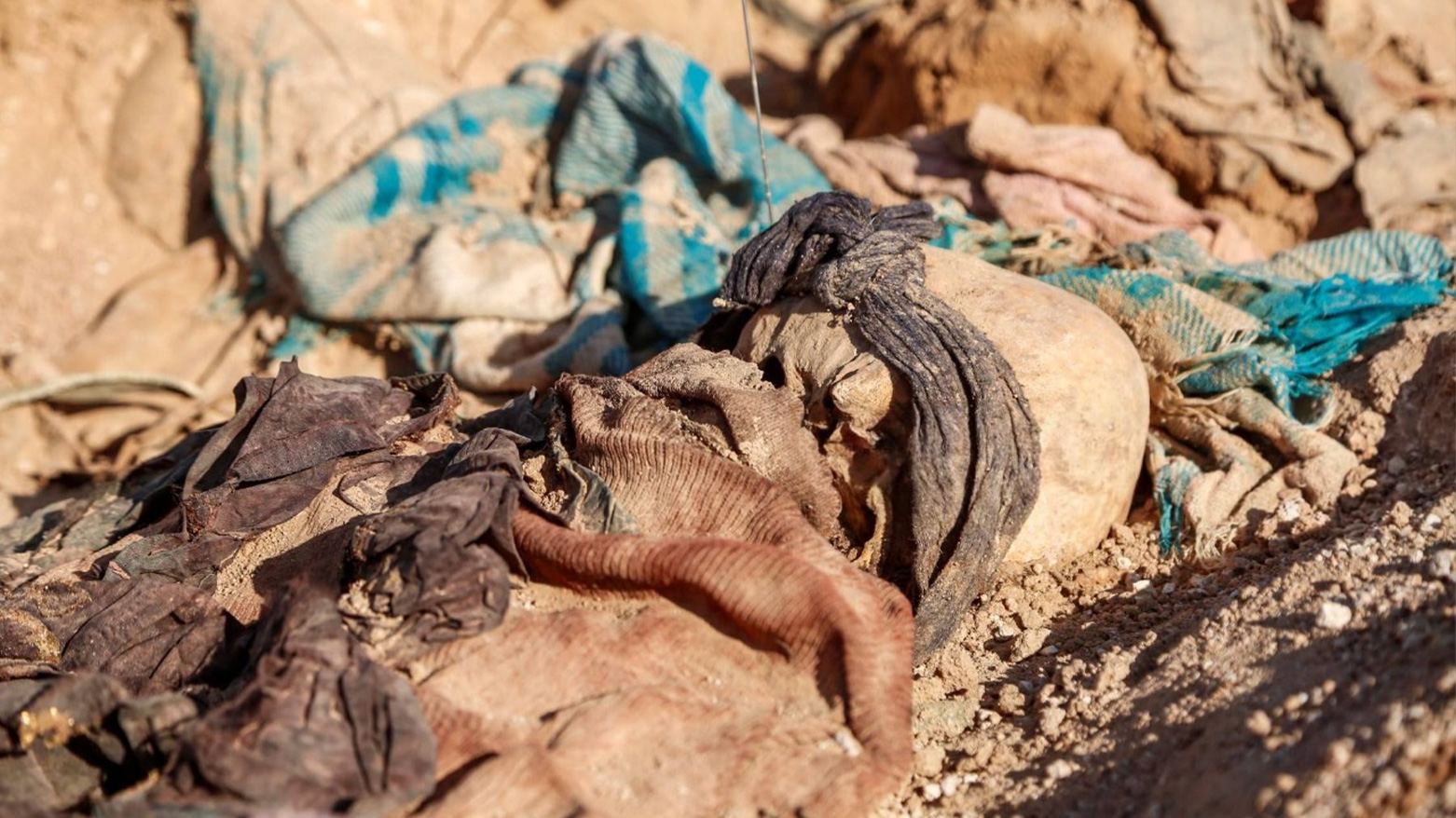Iraq’s Hidden Tragedy: 221 Mass Graves, 96 from the Baath Regime Era Revealed
Among the most horrific sites is the Samawa desert, where mass graves filled with Kurdish women and children reveal the genocidal intent behind Saddam’s policies.

ERBIL (Kurdistan24) – Ziya Karim, Director General of Mass Graves at the Martyrs Foundation, revealed on Sunday that Iraq harbors at least 221 documented mass graves, of which 96 date back to the Baath regime era.
"Of these, 134 mass graves have been exhumed—80 from the Baath regime era and 54 from the ISIS period. Meanwhile, 87 mass graves remain unexcavated, including 16 from the Baath regime and 71 from ISIS," Karim explained.
Karim added, "The total number of recovered remains has reached 7,709, with 4,451 dating back to the Baath regime period and 3,258 from the ISIS era."
Among the most horrific sites is the Samawa desert, where mass graves filled with women and children reveal the genocidal intent behind Saddam’s policies. The skeletal remains of entire families, buried together, stand as chilling evidence of the systematic extermination campaigns carried out against the Kurds and other groups.
The Kurdish people, in particular, suffered relentless persecution under Saddam’s rule.
The Halabja chemical attack of March 16, 1988, remains one of the most horrific crimes against humanity ever committed, with over 5,000 civilians killed in a single day.
The Anfal genocide campaign, orchestrated between 1986 and 1989, saw more than 180,000 Kurds forcibly disappeared, executed, or buried alive in mass graves across Iraq. To this day, many of their bodies remain undiscovered.
Karim revealed that 4,451 sets of human remains have been recovered from Baath-era mass graves, while thousands more await exhumation. Despite these grim findings, successive Iraqi governments, inheriting the burden of these crimes, have failed to deliver justice or meaningful compensation to the victims and their families.
The crimes of the former Iraqi Baath regime against the Kurdish people and other Iraqi communities remain one of the darkest chapters in modern history. From the Halabja chemical attack to the Anfal genocide campaign, mass graves, and the brutal suppression of political uprisings, the remnants of Saddam Hussein’s reign of terror continue to haunt Iraq.
On the 37th anniversary of the Halabja chemical attack, Kurdistan’s leadership once again underscored Iraq’s responsibility to address these unresolved crimes.
President Masoud Barzani, Prime Minister Masrour Barzani, and Kurdistan Region President Nechirvan Barzani all issued statements demanding full recognition of Halabja’s provincial status and financial compensation for survivors.
Earlier in the day, President Masoud Barzani, Prime Minister Masrour Barzani, and Kurdistan Region President Nechirvan Barzani issued statements marking the occasion.
Their messages highlighted the ongoing responsibility of the Iraqi federal government to formally compensate the victims and recognize Halabja as an official province of Iraq.
In his message, released via his official X account on Sunday, President Barzani paid tribute to the thousands who lost their lives in the massacre and emphasized that the pain of Halabja remains deeply ingrained in the collective memory of the Kurdish people.
“The wounds and pain of the Halabja chemical attack will forever remain in the heart and soul of every Kurdish person and will not be forgotten,” President Barzani stated.
“The responsibility for this crime against humanity and its consequences, including compensation for the victims' families, rests on the shoulders of the Iraqi state,” he stated.
Read More: ‘The Iraqi State Bears Full Responsibility for Halabja’s Suffering’, President Barzani
Kurdistan Region’s President Barzani reaffirmed his stance that the people of Halabja and all victims of genocide must receive the compensation and services they deserve. He urged the Iraqi government to meet its legal and moral obligations toward Halabja, fulfill its commitments to the victims, and finalize the long-overdue approval of Halabja’s status as a province.
Read More: KRP Barzani: Halabja’s Pain Endures, Justice Must Be Served
Prime Minister Masrour Barzani reiterated that the KRG considers it a primary duty to enhance services and improve the quality of life for Halabja’s residents. He acknowledged the ongoing challenges faced by the province and assured that further efforts would be made to meet the needs of its people.
Read More: 'Regrettable That Baghdad Has Not Provided Justice for Halabja,' PM Barzani
“In recent years, numerous service projects have been implemented in various sectors in Halabja Province. However, we recognize that Halabja requires additional services. In this regard, we reassure the respected and sacrificing residents of Halabja Province that we will provide better and increased services to the area in the future,” he stated.
Despite international recognition of the Halabja attack as genocide, Iraq has done little beyond symbolic gestures. Even though the Iraqi High Criminal Court officially classified the attack as genocide in 2010, there has been no substantial action to address the suffering of survivors or their families.
The Iraqi parliament has yet to grant Halabja full provincial status, a long-standing demand of its residents and Kurdish leaders.
Political analyst Ali Tamimi stressed the urgent need for Iraq to join the Rome Statute of the International Criminal Court (ICC), which would allow for the prosecution of individuals responsible for crimes against humanity in Iraq since 2003.
Without such mechanisms in place, the architects of genocide and their enablers may never face true justice.
The crimes of Saddam’s regime may have been committed decades ago, but their consequences remain ever-present. The Iraqi state has inherited a dark legacy of mass killings and ethnic persecution, yet it continues to neglect the fundamental responsibility of reparations and recognition.
The Kurdish people, who endured chemical attacks, forced displacements, and executions, still await justice.
As Kurdistan and the international community commemorate the anniversary of Halabja, the question remains: how long will Iraq continue to ignore the crimes it has inherited?
Until proper justice is served, the scars of Halabja, Anfal, and the mass graves of Iraq will remain an indelible mark on the nation’s conscience.